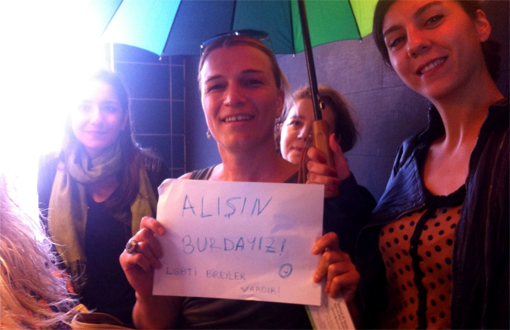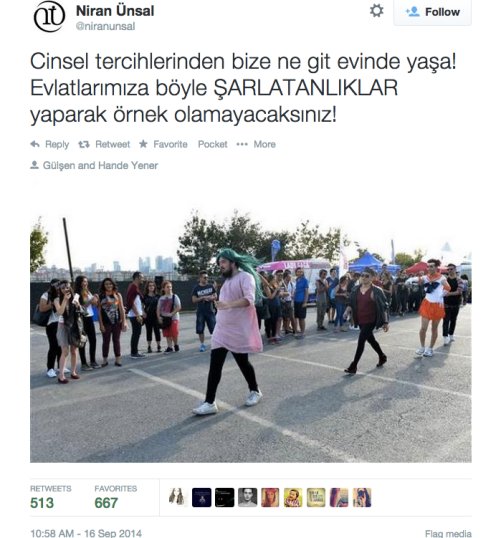May 17th, the day homosexuality was removed from the classification “illness”, has come to be celebrated for the last 11 years as the International Day Against Homophobia, Biphobia and Transphobia. Many years have passed since the Declaration of Montreal on Lesbian, Gay, Bisexual, and Transgender Human Rights, which was published following the International Conference on LGBT Human Rights, has called for all nations to recognize this date. Yet, the stigmatization of and discrimination against LGBTIs continue to this day.
This Sunday, May 17th marks the 11th year of the International Day Against Homophobia, Biphobia and Transphobia (IDAHOT), which was established in order to fight against homophobia and transphobia, to raise the public’s awareness about LGBTIs, to draw attention to rights violations and discrimination, and have their voices be heard. Following the removal of homosexuality from the classification of “illness” by the World Health Organization on May 17th, 1990, and published after the International Conference on LGBT Human Rights, which was organized by the UN, the Declaration of Montreal called for all nations to recognize that date and the wide array of rights and freedoms that ought to be secured. Until now, 130 nations did so formally. Yet, unfortunately, even though many years have passed since then, the stigmatization of and discrimination against gays, lesbians, bisexuals, and trans continue.
In Turkey, as in many other regions of the world, prejudice and discrimination not only cause LGBTIs to be excluded from health programs and limit their access to health services but also deprive them of the most basic human rights. Furthermore, discrimination on the basis of sexual orientation and gender identity also show themselves in the forms of violence and hate murders. While numerous LGBTIs are massacred in hate murders, many others are forced into making their voices heard through suicide. In the meantime, the government, which refuses to recognize the very reality of LGBTIs, fails to take any legal precautions to protect LGBTIs whom it deprives of basic human rights.
SPoD (Social Policies, Gender Identity and Sexual Orientation Studies Association) has began its journey with the goal of drawing attention to the discrimination against LGBTIs, of showing that gays, lesbians, bisexuals, trans, and intersex are neither alone nor in the wrong, and of producing stronger solutions to their problems. In preparation of May 17th, the day to protest and struggle against all physical, moral, or symbolic violence on the basis of sexual orientation and gender identity, SPoD has compiled the following 24 problems commonly experienced by LGBTIs.
- LGBTIs’ existence is defined through concepts such as illness, perversion, sin, immorality, and other terms of negativity and negation. This situation, in turn, pushes LGBTIs into hiding their identities, into acting as that which they are not, into depression, and into thoughts of suicide. Yet, the medical institution defines homosexuality not as an illness but as an expression of human sexual diversity.
- Unrecognized and unprotected by the Constitution’s article on equality [Article 10], which fails to specify them by name, cannot benefit from social and economic rights afford to “all citizens.”[1]
- Their most basic rights, such as the right to life, to labor, to housing, to health, and to education, are disregarded.
- The current government and the pro-government media publicize them to be ill and perverted and target them.
- They are subjected to humiliation and verbal and physical harassment and violence.
- They are forced into exile to large urban centers in order to be free, to live comfortably, and to be free of social pressure.
- They are allowed only in certain regions of the cities.
- They are readily evicted from overpriced rental properties.
- Because they are not protected as a recognized disadvantaged group [by law], they either cannot find employment or have to endure long periods of unemployment. When they announce their identities or orientations, they are fired, subjected to workplace harassment, sexual harassment, and blackmail.
- LGBTIs, who already have limited access to health services, are pushed out of health programs. They have difficulties especially in accessing services related to sexual health.
- Sexist, homophobic, and transphobic discourses are deployed in textbooks. LGBTIs who are educators face dismissal under the pretense of acting against public morality or of acting dishonorably.
- LGBTIs who lack social security and stable income are clearly targeted more by discrimination and have a difficult time protecting themselves.
- While the internal dynamics of hetero relations are not questioned, LGBTIs are always subject to public curiosity [and scrutiny]. Homosexuals are treated as if they were merely sexual beings [2]. Their sexuality is scrutinized and pulled to shreds while they are subjected to absurd and offhand “jokes,” as if such behavior were part of ordinary life.
- The lack of the right to establish legal partnerships [civil unions –Trans.] brings with it economic and emotional problems. They are not afforded any of the related rights, including the right to making medical decisions when the spouse gets sick or the right to inheritance if the spouse dies. The state does not provide any legal protections to couples who have been cohabiting for years, even decades. Spouses are obstructed from visiting their partner in the hospital, or even from attending to their partner’s funeral.
- They are not legally allowed to adopt children.
- The majority of LGBTIs live alone when they become elderlies. Because the state does not produce any protective effort or projects, it is not only more difficult for them to fight against discrimination but they also experience various problems in relation to housing and care. They are once again forced to keep their sexual orientation and gender identity as they age.
- A widespread exclusion is experienced by those who are discriminated against on the basis of their sexual orientation and gender identity in school, at work, at home, on the streets, and in the public sphere.
- They cannot benefit as they need from public transportation services due to various prejudices.
- In murders of LGBTIs, the murderers either remain unidentified and uninvestigated or enjoy impunity in the judiciary as their sentences are reduced under the pretense of “unjust provocation.” As violence is legitimized, instances of suicides among and of hate crimes against LGBTIs increase.
- According to the 2015 Trans Rights Europe Map and Index, Turkey, which demonstrates significant shortcomings in protecting trans people and recognizing gender identity [and gender expression], is 9th highest in the world for the frequency of hate murders against trans individuals. There are countless cases of assault, bodily harm, and murder with LGBTI victims, who are one of the most targeted groups in hate crimes.
- The harder it is for LGBTIs to announce their sexual orientation or gender identity, the harder it becomes for them to access the legal system and to bring to the judiciary their struggles. Another important problem is the chaos in the legal system and the vagueness of laws as they relate to LGBTIs. Even bars lack commissions regarding this issue.
- Many LGBTIs are subjected to hetero/sexist profanities, insults, and police brutality, with trans people being targeted by such dishonorable conduct the worst.
- Lesbians, bisexuals, and trans women are not allowed in shelters when they are subjected to violence. Gays and trans men, on the other hand, do not have any resources they can appeal to when they are subjected to violence.
- In situations where their appearance is perceived not to abide by the color of their ID card [3], trans women and men are subjected to various allegations [by law enforcement officers and private security and citizens alike –Trans.], such as “is this yours or is it your sibling’s?” or “did you steal this ID card?”
Mehtap Doğan
Media Director, Media Partnership Communications Consultation
mehtapdogan at mpiletisim.com
LGBTI NEWS TURKEY is the official translation source for SPoD LGBTI’s “In school, at work, in the parliament: LGBTIs are everywhere!” campaign, which is endorsed by the International Gay and Lesbian Human Rights Commission (IGLHRC).




